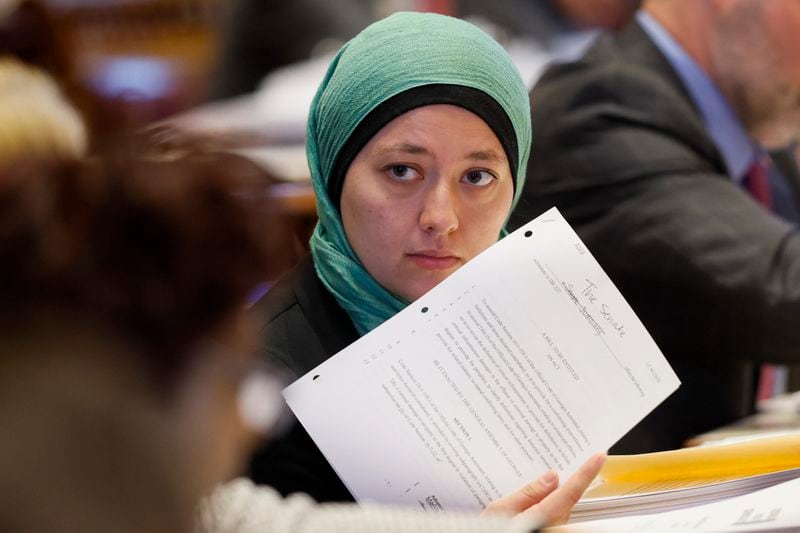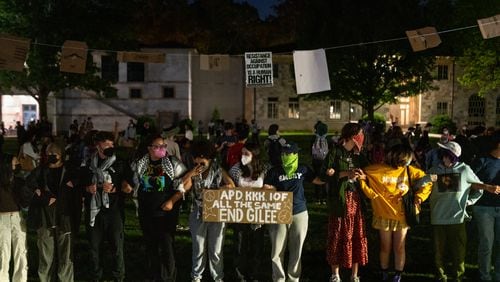Amid the Israel-Hamas war, Georgia lawmakers are wading into a fraught debate over how to protect Jewish people from antisemitism without restricting freedom of speech.
Bills that would make antisemitism a hate crime are poised to become some of the most contentious proposals at the Georgia Capitol after deep divides doomed similar measures last year.
Even before Hamas attacked Israel on Oct. 7, hate groups repeatedly distributed fliers smearing Jewish people in Atlanta-area neighborhoods.
But lawmakers couldn’t agree on how to define antisemitism and what kinds of criticisms of Israel are unacceptable.
The legislation would add antisemitism to the state’s existing hate crimes law that allows harsher criminal penalties against those who target victims on the basis of race, gender, sexual orientation, sex, national origin, religion, or physical or mental disability. The measure could also apply to discrimination cases in colleges and government agencies.
While legislators from both parties condemn extremists who target Jewish people, the antisemitism proposal enflamed disagreements based on religious faith and identity, especially among Democrats who denounce Hamas but sympathize with victims of the war in the Gaza Strip.
State Rep. Esther Panitch, the only Jewish legislator in Georgia, said the General Assembly needs to take a stand.
Credit: Natrice Miller/AJC
Credit: Natrice Miller/AJC
“If the bill can’t pass now, I don’t know if it ever will short of having a Jewish Georgian killed and an antisemite blaming their feelings on Israel because that would not be covered under current law. Nobody wants that,” said Panitch, a Democrat from Sandy Springs. “The new type of antisemitism is cloaked in an anti-Israel narrative.”
The key sticking point is that under the bill, Georgia would adopt into law a definition of antisemitism that includes examples of when speech against the nation of Israel would amount to antisemitic remarks.
Rather than writing into law what it means to be antisemitic, the legislation calls for Georgia to rely on a definition created by the International Holocaust Remembrance Alliance, which cites several examples of when speech against Israel as a nation could be interpreted as attacks against Jewish people.
“The bill will not do a lot on fighting antisemitism but will do a lot to further criminalize any criticism of Israel’s human rights abuses,” said state Rep. Ruwa Romman, a Democrat from Duluth and one of four Muslims in the General Assembly. “The bill sounds great — nobody can oppose the caption of the bill. What people oppose is the body of the bill.”
Credit: Jason Getz/AJC
Credit: Jason Getz/AJC
For example, the International Holocaust Remembrance Alliance considers it antisemitic to claim that the existence of Israel is a racist endeavor or to draw comparisons between Israeli and Nazi policies.
Upcoming disputes over antisemitism in Georgia follow contentious congressional hearings featuring Ivy League university presidents who were unable to say whether calls for the genocide of Jews would violate school conduct policies.
Whether Georgia’s antisemitism bill passes will largely depend on the Republican majority in the General Assembly, which overwhelmingly supports Israel in the war and recently passed resolutions condemning Hamas. Last year, the measure cleared the House but stumbled in the Senate over concerns it could be used to curtail freedom of speech, especially on university campuses.
State Sen. Ed Setzler, a Republican from Acworth, said legislators need to carefully spell out antisemitism rather than repeat the IHRA definition wholesale in state statutes. The Georgia Supreme Court struck down the state’s hate crimes law in 2004 for being “unconstitutionally vague” before legislators passed a new version in 2020.
“Antisemitism is a real issue in our criminal courts, in our civil courts and in administrative settings. The scope of this is way broader than most citizens can imagine,” Setzler said. “As such, we need to be very thoughtful in how exactly we craft this statute.”
A group of conservative Christian leaders — including Pastor John Hagee of Christians United for Israel and Ralph Reed of the Faith and Freedom Coalition — recently wrote a letter urging senators to move forward with the antisemitism bill.
They said the legislation wouldn’t criminalize speech and instead would create a framework that could be considered when investigating whether crimes were motivated by hatred toward Jewish people.
Credit: Natrice Miller/AJC
Credit: Natrice Miller/AJC
“Currently Neo-Nazis, white supremacists, and other extremist bigots are targeting the Jewish community in the United States,” the letter states. “We would never seek to deny anyone their right to free speech, no matter how repugnant we might find certain statements, but our state leaders have a role to play in this fight.”
Besides the antisemitism legislation, House Bills 30 and 144, other bills relating to religion will also be considered this year.
Setzler has introduced a “religious liberty” bill that would limit the state government’s ability to pass and enforce laws that conflict with religious beliefs, a proposal that gay rights advocates say could be used to justify discrimination.
In response to antisemitic fliers, Panitch plans to propose a bill that would criminalize unauthorized distribution of materials designed to harass or intimidate based on religion or ethnicity, similar to laws and ordinances recently approved in Florida and the city of Brookhaven.
The International Holocaust Remembrance Alliance’s definition of antisemitism
Part of the debate over legislation that would make antisemitism part of Georgia’s hate crimes law is its reliance on a definition provided by the International Holocaust Remembrance Alliance. The definition itself is two sentences, but it’s accompanied by 11 examples of antisemitism, six of which mention Israel. Here’s the definition:
“Antisemitism is a certain perception of Jews, which may be expressed as hatred toward Jews. Rhetorical and physical manifestations of antisemitism are directed toward Jewish or non-Jewish individuals and/or their property, toward Jewish community institutions and religious facilities.”
Source: https://www.holocaustremembrance.com/
About the Author











